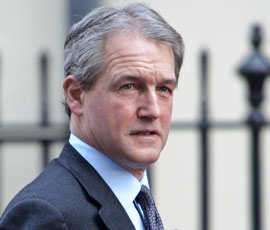CAP deal raises concerns for English farmers

Controversial plans that would see English farmers face tougher environmental measures have moved a step closer following a CAP reform agreement in Brussels.
After two days of intense negotiations, DEFRA secretary Owen Paterson won the right for the UK government to introduce its own environmental scheme, rather than greening measures proposed by Brussels.
The original proposals were that member states should be required to offer the commission’s greening measures in parallel with their own.
But Mr Paterson has secured agreement from his fellow European agriculture ministers that countries will have the freedom to design their own measures instead.
He claims this will mean England can avoid the “costs and confusion” of parallel schemes and build on the success of existing agri-environment schemes.
“The UK should have the freedom to have a simple, easy to manage system that builds on our well established arrangements,” he said.
“We’re now one very important step closer to being able to set our own greening measures, which work for farmers and use taxpayers’ money more effectively to deliver real environmental benefits.”
The news will anger farm leaders who are against the plans because they feel it will leave England’s farmers at a disadvantage to their European neighbours.
“A one size fits all approach to CAP just doesn’t work. England, Northern Ireland, Scotland and Wales must be allowed the freedom to deliver outcomes tailored to their own circumstances.”
Owen Paterson, DEFRA secretary
A coalition of 24 farm groups is arguing that such a deal will allow DEFRA to go further than demanded by the EU Commission – effectively gold-plating EU greening requirements.
Speaking after the deal was struck, Mr Paterson said: “A one size fits all approach to CAP just doesn’t work. England, Northern Ireland, Scotland and Wales must be allowed the freedom to deliver outcomes tailored to their own circumstances.”
DEFRA has said discussions with farmers can now begin on how greening should be designed, alongside the next Rural Development Programme.
Other developments on the CAP package include a decision to end sugar beet quotas in 2017.
The EU Council also concluded that coupled payments, the proportion of CAP subsidies linked to production, should increase.
Under the proposals, member states, including the UK, will be allowed to pay up to seven percent of their direct payment budget as coupled payments.
The latest stage in the CAP reform process was given a cautious welcome by Scotland’s rural affairs secretary Richard Lochhead.
There had been more steps taken forward , than back, he said. Some important flexibility had also been secured.
“The failure to secure the level of coupled payments we wanted has however tainted the deal for me and I’m even more concerned at the two-tier system currently being proposed which will leave Scotland unable to spend more than 7%, compared to the 12% offered to other nations,” he said.
“I sincerely hope that this is one area which can be addressed in the negotiations between the European Parliament and the presidency.
“The European Parliament has adopted a much fairer position on this and I hope this matter can be addressed.”
After a final deal is agreed, which is expected to be in June, work will begin to implement the new rules and to negotiate how best to share the CAP budget within the UK.
For the latest news on CAP reform see our dedicated page
